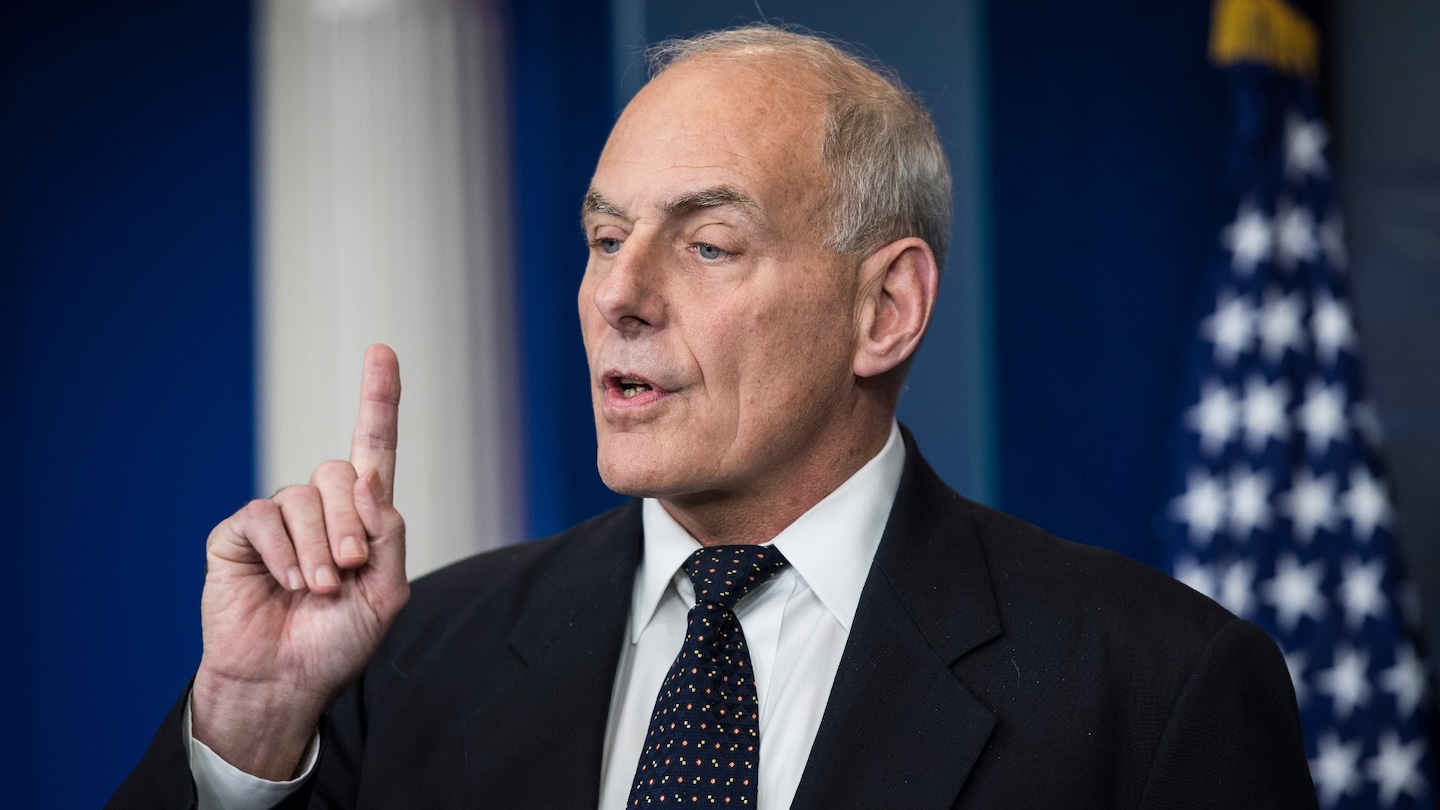John Kelly defended Trump’s military comments before. Why not now?

Zach Fuentes, Kelly’s close ally and former deputy White House chief of staff, offered a somewhat narrow denial on Monday, saying he didn’t hear Trump call veterans “losers” or “suckers” when he briefed Trump on the weather before a planned visit to a military cemetery in France. But it’s not clear that this is precisely the context in which Trump is alleged to have made the remarks. Fuentes also suggested that the initial report from the Atlantic may have “conflated” events from another point in the trip — raising questions about what was said at those other junctures.
Perhaps the one person who could shed light on most of the key aspects of the story, though, is Kelly.
Some have interpreted Kelly’s lack of public comment as tacitly confirming the report, noting that he could very easily deny its substance. Sources close to him have instead said that he, as a retired general, simply doesn’t want to get involved in partisan politics.
“He wants to avoid taking a position that might be perceived as political,” Anthony C. Zinni, a retired four-star Marine Corps general and close Kelly ally, told the New York Times. “I also think he takes to heart the commitment to confidentiality in matters related to their interaction with the president.”
It has been noted that this stands in stark contrast to the other general Trump put in a high-ranking position, former defense secretary Jim Mattis, who has strongly criticized Trump lately.
But even setting that aside, Kelly’s decision is particularly perplexing, given his decision to weigh in on another matter in which Trump also allegedly treated a deceased soldier with disrespect — an episode that amounted to Kelly’s most controversial moment as Trump’s chief of staff.
Back then, Trump had been accused by Rep. Frederica S. Wilson (D-Fla.) of being insensitive while talking to the widow of Army Sgt. La David T. Johnson, who was killed while on duty in Niger. The congresswoman said Trump had told the widow that Johnson “must have known what he signed up for.” The story was backed up by the widow’s mother, who was on the call, too.
The alleged remark bears some resemblance to what Trump is now accused of having said. The White House flatly denied it then, as it has with these new allegations. Then, in a highly unusual scene, Kelly appeared at a news conference to defend Trump. Not only had Kelly been on the call, making his version of events important, he’s also a Gold Star parent himself. His son was killed in Afghanistan in 2010. In that light, Kelly stepping forward to defend Trump was hugely significant.
What followed wasn’t a proud moment for the White House. In the course of his defense, Kelly called Wilson an “empty barrel” and suggested she shouldn’t have been on the call, which should have been “sacred.” (Except the congresswoman’s relationship with the family dates back decades.)
Furthermore, Kelly appeared to offer a false account of 2015 remarks Wilson gave in which he alleged that she had grandstanded in claiming credit for securing federal funding for a new building. Video of Wilson’s speech soon surfaced showing her saying no such thing. Kelly declined to apologize, standing by his comments and suggesting that she may have said things in private discussion, but he declined to explain further.
It seems somewhat likely that experience is coloring Kelly’s decision not to speak out now. Perhaps he doesn’t want to live through all that again, especially given the very similar underlying charge against Trump involved. But the fact remains that Kelly opted to weigh in on such a charge — in a highly unusual way and in defense of Trump — and now he hasn’t.
One could certainly argue that Kelly cast aside being an apolitical retired general by becoming Trump’s chief of staff. Even more so than being homeland security secretary — Kelly’s previous job — it’s a thoroughly political position. Even if you think men like Kelly can do that job, leave and remain above politics, the fact is that the seal was broken when Kelly weighed in.
At least in that case, there was perhaps some ambiguity in Trump’s comments. Maybe he said something insensitive but didn’t mean it as such. And interestingly, that tracks with how the Atlantic describes how Kelly initially interpreted Trump’s 2017 comments while visiting the gravesite of Kelly’s son, Robert, who was killed in Afghanistan in 2010:
… According to sources with knowledge of this visit, Trump, while standing by Robert Kelly’s grave, turned directly to his father and said, “I don’t get it. What was in it for them?” Kelly (who declined to comment for this story) initially believed, people close to him said, that Trump was making a ham-handed reference to the selflessness of America’s all-volunteer force. But later he came to realize that Trump simply does not understand non-transactional life choices.
It’s Kelly’s choice when it comes to whether to engage on this reporting, either to dispute or to confirm it. But in very similar circumstances previously, he chose to dispute such allegations. He also made the decision relatively recently — in early 2020 — to criticize Trump in a way that brought a rebuke from the president.
If Kelly has a defense here, it’s in not wanting to divulge personal conversations with Trump. But the idea that he wants to be above getting involved in partisan politics doesn’t really wash with what happened in 2017.






